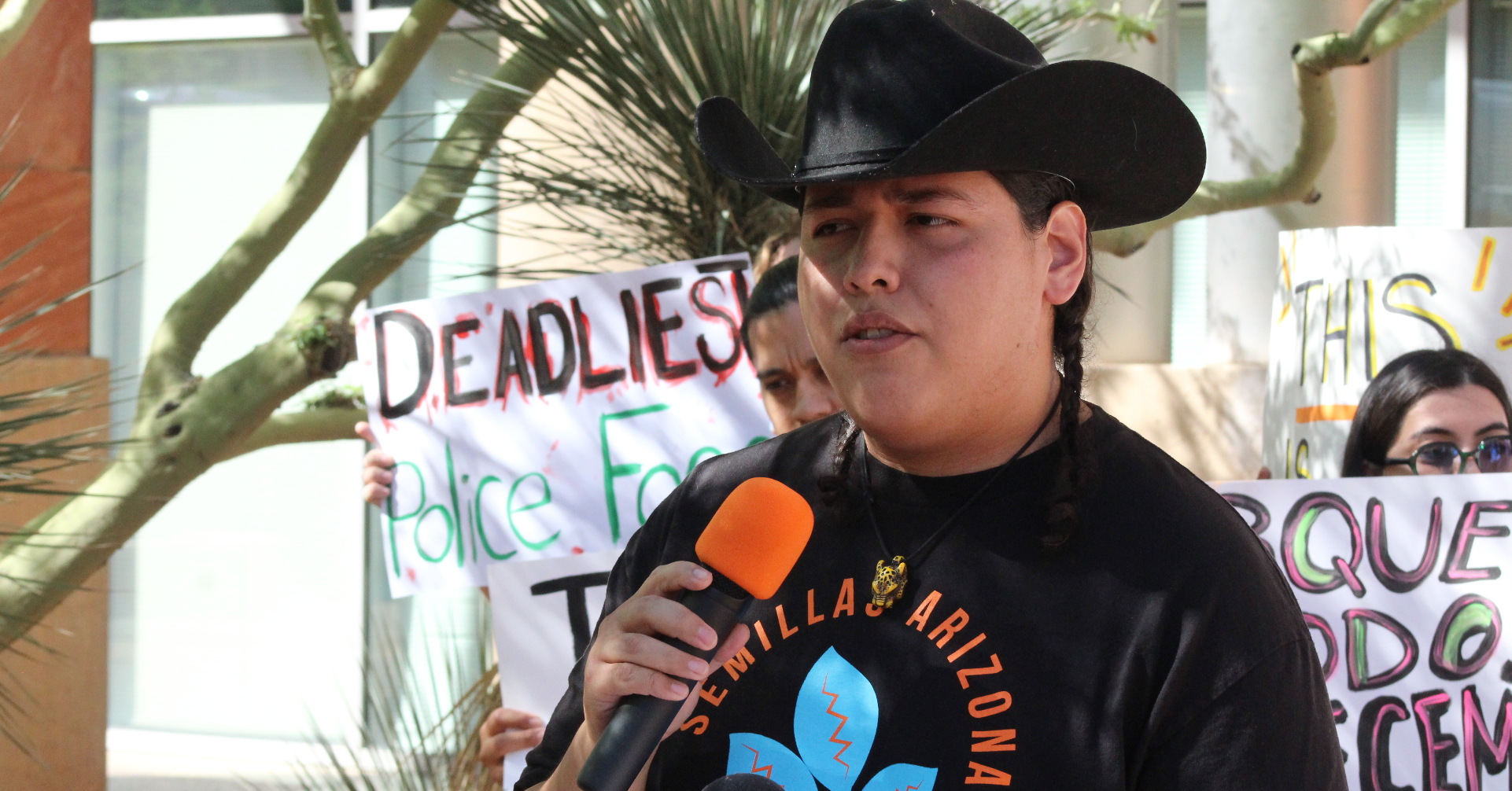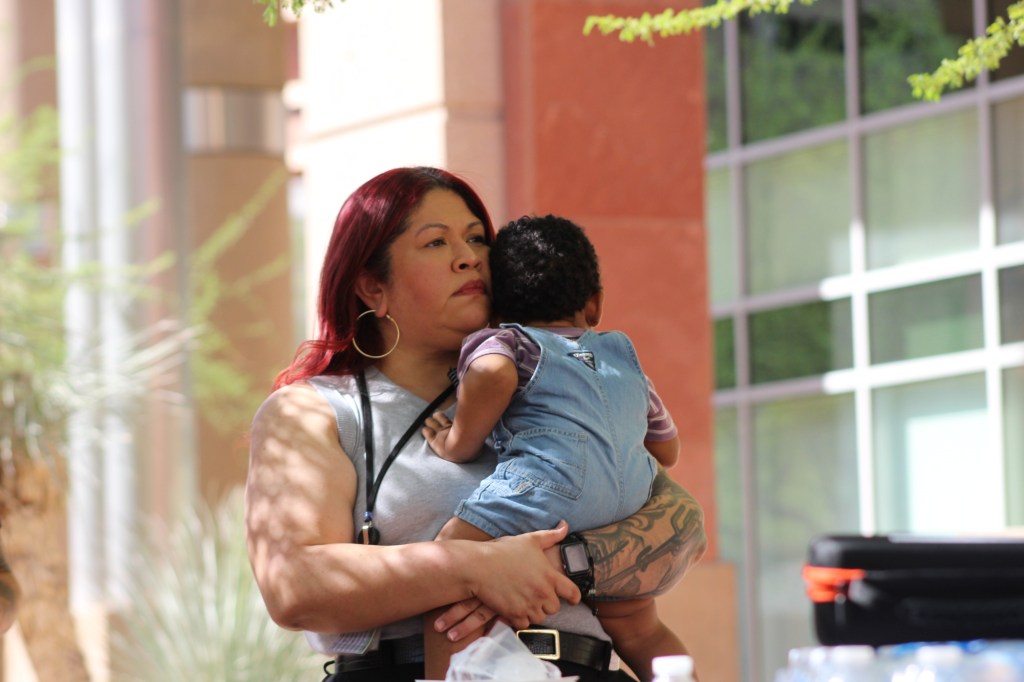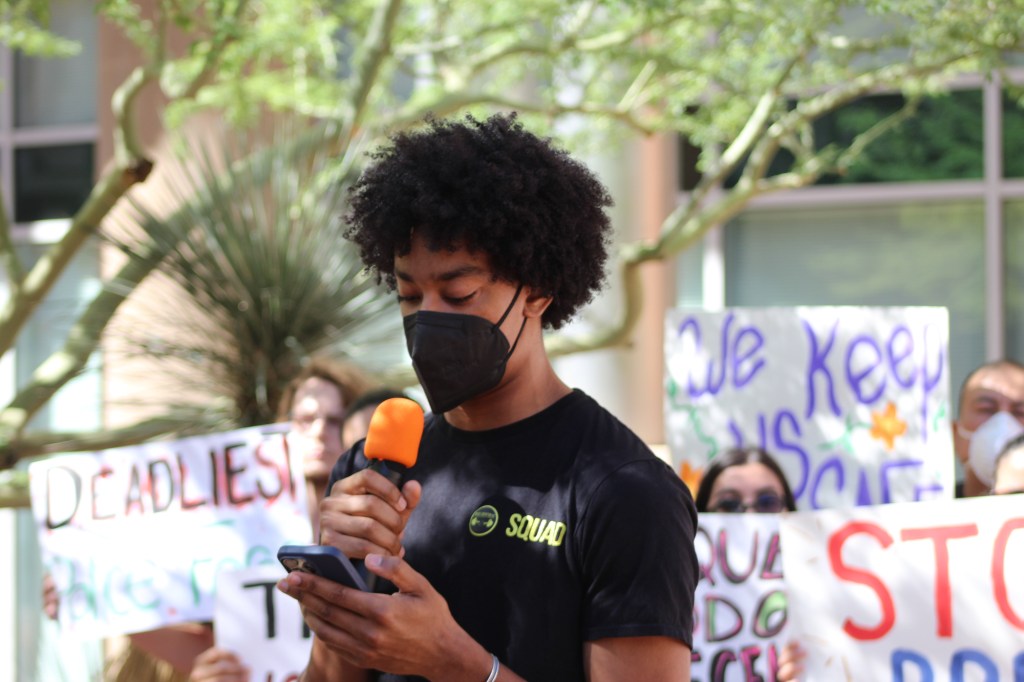
TJ L’Heureux

Audio By Carbonatix
Until mid-August, 2025 was looking like a year in which the Phoenix Police Department might finally turn things around. After police killed four people in the first two months of the year — including one who was hit in the heart by a “less-lethal” weapon — there were no fatal police shootings for six months.
Since then, though, it’s been the same old song and dance. Phoenix police shot and killed six people in a 54-day span between Aug. 19 and Oct. 11, putting the department on pace to match its 2023 total of 12 police killings. Last year, Phoenix police shot and killed 14 people.
Since 2013, the Phoenix Police Department has been the second-deadliest in the nation, killing at least 173 people.
The recent run of shootings has almost coincided exactly with the beginning of Matt Giordano’s tenure as the city’s new police chief. It’s also led to a louder chorus of criticism from activist groups, many of which gathered at Phoenix City Hall on Wednesday afternoon to call out Giordano and Phoenix Mayor Kate Gallego over the shooting spree.
About a dozen people from a variety of community groups — including Poder in Action, Semillas Arizona and Black Lives Matter — participated in the event. Elsa Gebreyohanes, an organizer with Black Lives Matter’s Phoenix Metro chapter, said the recent string of shootings is just the most recent example of the city’s cops using “deathly force whenever they feel like it” and avoiding accountability.
So far, none of the department’s 10 fatal shootings have been deemed out of police policy.
“An environment where the police can kill you at any time, at any moment, without any consequence, leaves us in a place where we are always at danger, always at risk,” Gebreyohanes said. “The response from our city — from our officials — has been either radio silence or more money to the police.”
Indeed, the Phoenix City Council passed a $46 million increase in the police budget this year, bringing the total funding to over $1 billion annually.
“We do not need more technology for a police department whose annual budget is over $1 billion,” Nancy Lam, the political coordinator at Poder in Action, said at the press conference. “We need to shift that funding to large-scale reinvestment in the communities that Phoenix has abandoned.”
The only elected official seen at the event was Councilmember Anna Hernandez, a progressive whose own brother was gunned down by police several years ago. Hernandez didn’t speak at the press conference, instead standing by to listen, though she told Phoenix New Times via a written statement that the run of shootings is “not acceptable” and that “the swift rise in officer-involved shootings since the new chief took office needs to be addressed.”
“I implore the chief to get a hold of this department and officer behavior,” Hernandez said. “We cannot have another epidemic of police violence.”

TJ L’Heureux
Giordano’s response
In a response to a request for comment, the Phoenix Police Department referred New Times to a press release Giordano distributed on the spate of shootings several weeks ago.
Midway through the current streak, when Phoenix officers had killed four people in 41 days, Giordano issued a press release announcing new policies and initiatives to promote de-escalation tactics and training for dealing with people in behavioral crises. He also said he wants to expand the use of less-lethal tools like Tasers and pepper ball launchers — though it should be noted that the first person killed this year by Phoenix cops was shot with a less-lethal baton launcher.
“We understand how deeply concerning this is to our community and we share your concern,” Giordano said in the statement. “We remain committed to continuous improvement. Policing demands courage, split-second decision making, and compassion in the toughest moments.”
Giordano’s initiatives have not had an immediate effect. On Oct. 2, the day after Giordano’s press release, Phoenix officers shot two more people — including an unarmed man — and killed one of them. Giordano traveled to the scene of the first shooting to reiterate his commitment to de-escalation in front of media members. On Oct. 11, Phoenix police shot two more people, killing one of them.
The department is now on track for 12 fatal police shootings.
Some of the killings have drawn more backlash than others. The Aug. 31 killing of 36-year-old Efrain Hidalgo — who was stopped for a bicycle infraction and shot after because he had a knife, though police never commanded him to drop it — enraged and concerned activists.
“Efrain should still be alive,” wrote Ben Laughlin, the co-director of Poder in Action, in a statement at the time. “These officers will say they felt threatened in order to justify killing Efrain. But they were the aggressors at every step of this incident. It was them who needlessly stopped Efrain, it was them who chased him when he fled in fear, it was them who tackled him, and it was them who pulled their weapons and fired on him 9 times simply because of the presence of a knife — the carrying of which is also not illegal.”
The killings come a year after the Department of Justice issued a blistering report on Phoenix police, noting that officers regularly committed civil rights violations, including discriminating against people of color and using excessive and unnecessarily deadly force. The DOJ’s investigation was initiated in 2021. Years before, in 2018, Phoenix led the nation in police killings with 23.
“That streak directly led to the DOJ investigation,” Hernandez said. “Now, PPD is showing us that behavior among officers hasn’t changed in spite of the work done by this department since that report was released. This is gravely concerning.”

TJ L’Heureux
Criticism for Gallego
The activists who spoke on Wednesday asked the police department to immediately release unedited body cam video within 72 hours of officer-involved shootings. They also implored the city council to pass a “Family Bill of Rights” for people whose loved ones are killed by police, cut the large police budget and provide funding for housing, healthcare, youth services, community crisis responses and mutual aid programs.
Some of the activists took aim at Gallego, who pushed back against the possibility of federal oversight sought by the DOJ under the Biden administration. The city instead ran out the clock through the election, which produced a win for Donald Trump and scuttled any chance at federally mandated reform.
“Kate Gallego has made her priorities crystal clear. She will sacrifice Black, brown and poor lives to protect the comfort of her white political base,” said Jorge Cornejo of grassroots organization Semillas Arizona.
Gallego’s office did not respond to a request for comment from New Times.
Cornejo also criticized Gallego’s role in the decision by the city council to rehire Ed Zuercher as city manager. Zuercher ran the city when Phoenix was breaking police violence records and retired amid a scandal that involved Phoenix cops and county prosecutors conspiring to charge protesters as members of a fictitious street gang.
Cornejo noted that the controversial decision to rehire Zeurcher — approved in a contentious 5-4 vote by the council — faced opposition from the councilmembers who represent “the very districts where people are dying” in central and west Phoenix.
“This is a government split in two,” Cornjejo said. “One half gets comfort, the other half gets coffins.”
Another activist from Mass Liberation Arizona, who identified himself only as Ahmed, also pointed the finger at Gallego and said she “keeps feeding that machine no matter the cost” to Black, brown and working-class people.
“Kate Gallego did not stumble into this crisis — she engineered it,” he said. “She sent Ed Zuercher out to pasture when the heat from the DOJ got too hot. And now, with the coast clear, she’s dusted him off and put him right back into position as her trusty bureaucratic lap dog.”